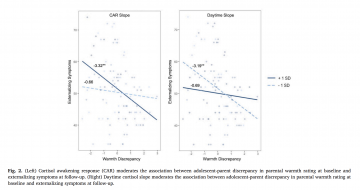Congratulations to Dr. LeMoult and collaborators for publishing their paper titled, “Biological Sensitivity to Adolescent-Parent Discrepancies in Perceived Parental Warmth” in Comprehensive Psychoneuroendocrinology!
Abstract:
“Introduction: Parenting behaviours are formative to the psychological development of young people; however, parent and adolescent perceptions of parenting are only moderately correlated with each other. Whereas discrepant perceptions may represent a normative process of deindividuation from caregivers in some adolescents, in others a discrepancy might predict psychological maladjustment. The biological sensitivity to context model provides a framework from which individual differences in development can be estimated in adolescents whose perceptions of parenting diverge from those of their parents.
Methods: At baseline, we obtained diurnal cortisol samples from US adolescents (M = 13.37 years of age, SD = 1.06) as well as parents’ and adolescents’ ratings of parental warmth; we obtained adolescent-reported symptoms of psychopathology at baseline and again at follow-up two years later (N = 108, 57.5% female). We estimated waking cortisol, cortisol awakening response, and daytime cortisol slopes using piecewise regression models.

Results: Lower adolescent than parent ratings of parental warmth predicted increased externalizing symptoms at follow-up. Higher waking cortisol and steeper cortisol awakening response and daytime slopes predicted increased internalizing symptoms at follow-up. Further, discrepant ratings of parental warmth interacted with cortisol awakening response and daytime slopes such that greater discrepancies predicted greater increases in externalizing symptoms in adolescents with steeper cortisol slopes.
Conclusions: These findings indicate that steeper changes in cortisol production throughout the day index a greater sensitivity to perceived parental warmth. Lower adolescent than parent ratings of parental warmth may represent dysfunction in the parental relationship rather than a normative process of deindividuation in adolescents with steeper diurnal cortisol slopes.”
Read the full paper here.